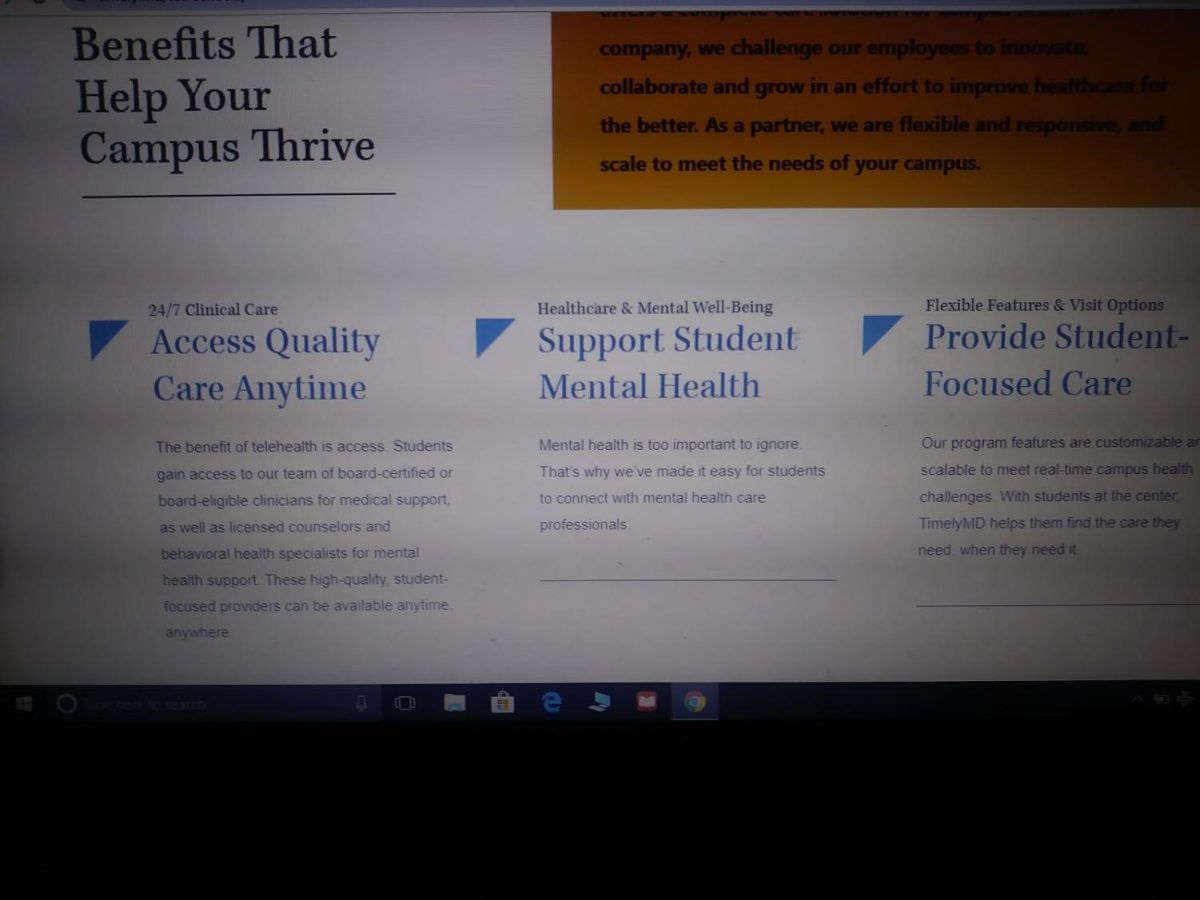Chancellor discusses student goals and programs to Los Rios staff
The webpage for Timely MD. Timely MD is a student resource discussed by Chancellor King and Director of Student Health and Wellness Dee Dee Gilliam, where students can access any medical or mental health issues they have.
Chancellor Brian King hosted a convocation meeting discussing a variety of topics regarding student outcomes and programs with the Los Rios Community College District staff on Friday.
The topics King discussed were equity and social justice, plans for reopening and the 2021-2022 budget.
“We want to improve outcomes for all of our students, but the focus is on those who have faced some of the greatest barriers historically,” said King.
The district planned a goal for each of these topics to be accomplished.
King said the goal for equity and social justice is improving course completion focusing on Black and Latino students.
“The board has set a very high bar for us to ensure they’re able to complete the courses they take and to close the gaps between our students of color and other students on completing English courses,” said King.
King also discussed the goal for reopening the district with a group of four leaders representing all four colleges. The group included American River College’s Interim Vice President of Instruction Frank Kobayashi, Folsom Lake College’s Vice President of Instruction Monica Pactol, Cosumnes River College’s Vice President administration Theresa Tena and Sacramento City College’s Vice President Davin Brown and decided summer classes will remain online.
“We know there are a lot of factors beyond our control in reopening and resuming face-to-face services and instructions,” said King. “The overwhelming factor that we don’t have any control over is vaccinations, and how the pace of vaccinations will have to pick up between now and fall.”
King explained the last goal for the 2021-2022 budget is for there to be structural budgets as soon as next year.
“There will be stimulus dollars at the federal level to help our students and to address costs that have been caused by the closure in the pandemic,” said King.
After a brief overview discussing the college goals, King introduced American River College President Melanie Dixon, Student Services Director Jazzie Murphy and Communications Professor Alisa Shubb, who spoke about home-based pathway communities.
Murphy said home-based pathway communities are not programs, but a culture shift of commitment to making changes.
“We’ve got to be willing to make some bold and competent culture changes about how we onboard our students, how we connect our students, how we wrap community around those students and help them realize their goal,” said Murphy. “Whether that’s degree or transfer, our students want a guided pathway.”
Shubb said ARC has a coordinated effort between instructional faculty and counseling faculty.
“When we get back onto ground, we have counseling faculty moving into home-based spaces and working with an instructional faculty liaison,” said Shubb. “It’s a pod of support for each of the home bases.”
After a chat with the ARC staff members, King introduced CRC English Professor Lisa Dominguez Abraham and CRC President Edward Bush, who talked about improving English outcomes.
Dominguez Abraham said there was support from the other English faculty at the Los Rios Colleges that supported Cosumnes River College.
“There’s a sense of mutual support that I believe we carry into the classroom and content better to our students,” said Abraham.
Bush said CRC has an instructional vision of improving success for students.
“When we look at the years of 2015 to 2019 on the English department, double the course completion rate in college-level English,” said Bush. “English is a gatekeeper, that when students pass college-level English in their first semester, it greatly increases the likelihood of them going onto transfer to achieve their degree and their certificate.”
Next, King introduced Folsom Lake College President Whitney Yamamura and Interim Dean of Instruction Mariko Peshon who discussed programs for incarcerated students.
Peshon said Folsom Lake College faculty and staff created a high-quality program called “coronaspondence,” which made remarkable accommodations in the curriculum.
“The way in which we teach music courses, psychology courses, we’re mailing in 3,000 envelopes, 2,000 CDs, 10,000 pieces of paper this week,” said Peshon. “It’s our faculty committing to their expertise and adapting the modality in which they’re teaching.”
Yamamura said the virtues of the “coronaspondence” programs are getting more involved.
“We have a strong program for formerly incarcerated students at Sacramento City College, we have taken some programs and courses at CRC, culinary in particular for the women’s program at Folsom,” said Yamamura. “It’s truly one of collaboration and cooperation.”
Next, King introduced Sacramento City College President Michael Gutierrez and Business Professor Debra Crumpton, who spoke about disaggregated data and how it affects us.
Crumpton said data is a reflection of your outcome.
“It gives us a common language to talk about where we are and how we can move forward,” said Crumpton. “It gives us that common framework and it gives us an objective place to start from.”
Gutierrez said data creates an awareness and a self-analysis.
“There’s been constant dialogue,” said Gutierrez. “While we’re having the dialogue, while we’re having professional development, the database is being established.”
King’s last staff member was Director of Student Health and Wellness Dee Dee Gilliam, who talked about resources for students with physical and mental health needs.
Gilliam said students can use Timely MD, a telehealth company, where they provide 24/7 service for students.
“Students can reach out with any medical issues, including COVID issues and also mental health and scheduled counseling available to our students,” said Gilliam. “It is a free service.”
At the end, King thanked the district staff for being a part of the convocation meeting.
“We’re going to do more for our students than we’ve ever done before,” said King.

